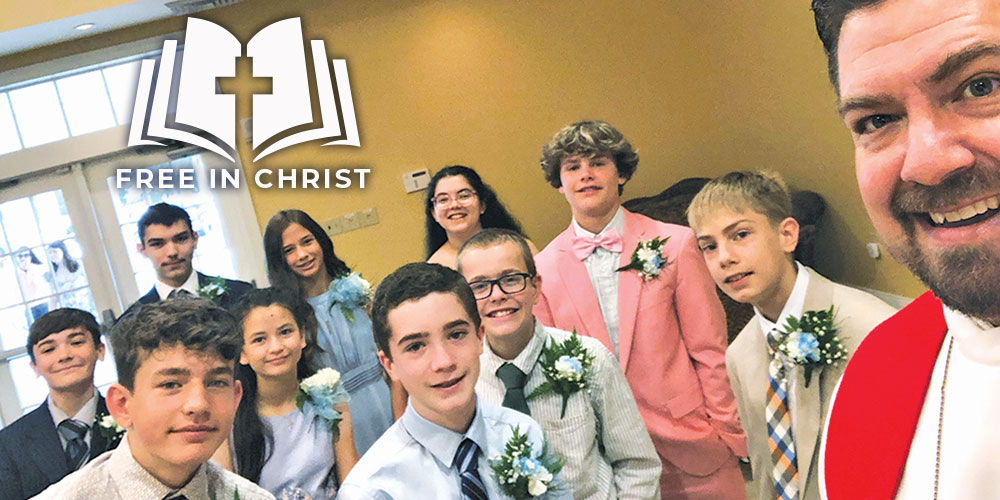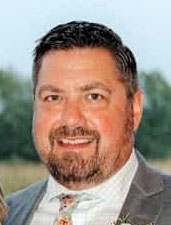 |
“We will tell the next generation the praiseworthy deeds of the LORD” (Psalm 78:4). Read how congregations are helping equip young adults for lives of faith and love.
Family-centered catechism
“As the head of the family should teach in the simplest way to those in his household” (Luther’s Catechism, 2017, p. 1).
Several years into ministry, the frustration got to me. My frustration involved catechism class and the lack of involvement from parents . . . other than dropping off and picking up their child. There was little parental follow-up with assignments or memory work. Truth be told, I had second-year catechism students who had collectively made it to weekly class 17 percent of the time . . . for the entire year!
There had to be a better way. A better way that was suited for parents and students both to grow closer to God and closer to one another. A better way that involved the parents in not only teaching but also learning the catechism themselves.
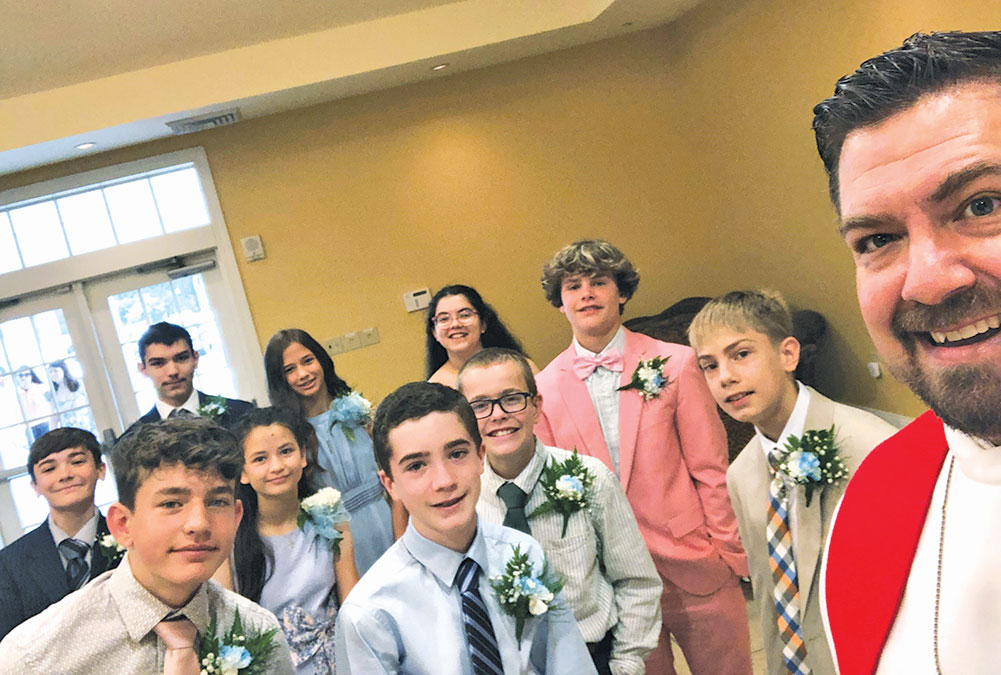
There was, and Luther had laid it out in 1529. The catechism (Greek for “sound back and forth”) “teaches what every Christian must know. . . . Therefore, it is the duty of every father of a family to question and examine his children . . . at least once a week and see what they know or are learning from the catechism. And if they do not know the catechism, he should keep them learning it faithfully” (Short Preface of Dr. Martin Luther, Large Catechism).
Family-centered catechism at Risen Savior, Pooler, Ga., is a program that provides a biblically grounded, practical, and flexible family spiritual growth process. This approach allows there to be a partnership between church, parents/home, and child/student.
The program is completed over two years. Parents and students come together monthly for a Rooted to the Family night. This group time allows the families to get to know other families who are part of the catechism program. Typically, these nights include three components: review of the last month of lesson content (this is done by a quiz parents and students take together), group roundtable discussion (usually from the discussion questions in previous lessons), and content introduction of upcoming lessons (the pastor leads parents through the lessons and discussion questions in the “parent-help” guide). Parents then conduct weekly lessons at home. Homework is due Sunday evenings, turned in through Google Classroom. I then correct the lessons and provide help in areas that seem to exhibit misunderstanding of lesson content.
The program includes memorization of Very Important Passages (VIPs) and Very Important Chapters (VICs). Program components also contain weekly sermon summaries and projects in a variety of areas, including a monthly service project.
From time to time, parents will share the concern that they don’t know enough about the Bible to teach their child. My encouragement includes highlighting that the catechism is specifically designed for parents to explore these teachings with their child.
This has shown to be true over the years: The most significant benefit is an entire family studying and learning God’s Word together weekly. There is simply no substitute for it.
Learn more about Risen Savior at risensaviorgeorgia.com.
Brian Pechman
Parents’ perspectives
Parents Equipped To Teach (PETT), the catechism instruction program at St. Andrew, Middleton, Wis., consists of 52 lessons focusing on the six chief parts of the catechism: the Ten Commandments, Apostles’ Creed, Lord’s Prayer, Baptism, Ministry of the Keys and Confession, and the Lord’s Supper. We recently used the program with our two daughters, ages 15 and 12.
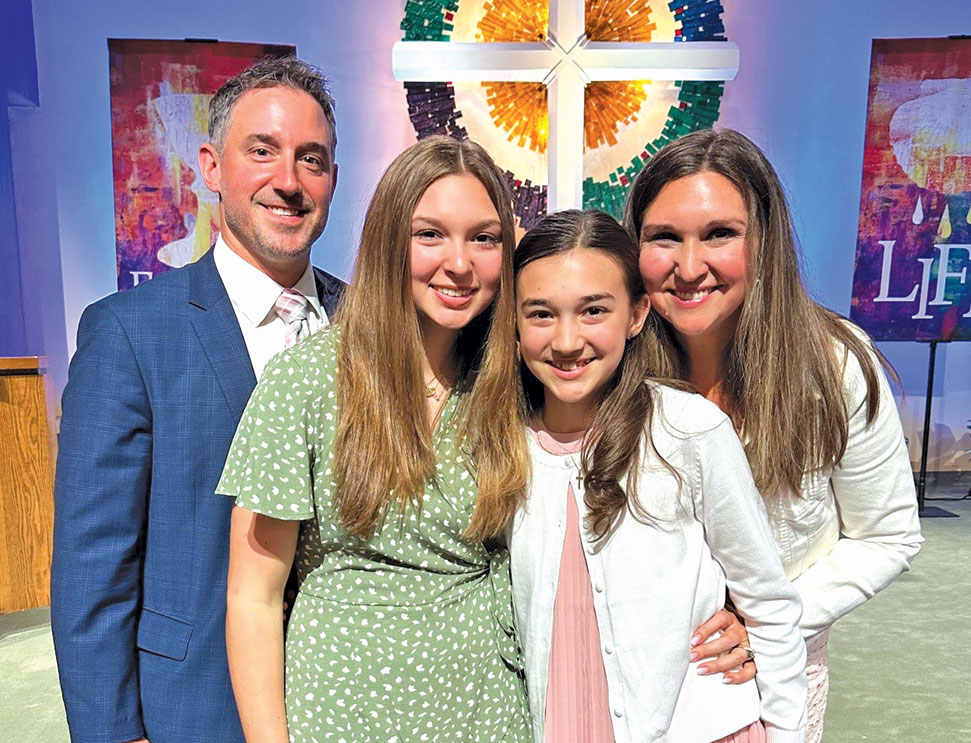
Each week, our daughters would read and study a lesson (or two) and the associated passages. Our pastor, Pastor Randy Hunter, provided videos for us as the parents with instructions about the lesson and the key points for discussion. Both of our daughters received a catechism (Luther’s Catechism, 2017) and a workbook that asked questions about the lesson and how it related to their lives. After they read the lesson, we came together as a family to discuss the questions and talk about the lesson. Each lesson took about an hour and included a verse to commit to memory.
We thoroughly enjoyed this process for many reasons. It blessed us with the ability to participate in the learning process together. Our children were able to provide their own perspective on each lesson, and we discussed it as a family. PETT is completed at your own pace, and some weeks we were able to tackle more than one or two lessons, depending on our schedule. The flexibility also allowed us to take our time and really dive into the lesson and ensure our children were learning and not just going through the motions.
After we completed each part of the catechism, we met with our pastor to ensure that our daughters were understanding the lessons and memorizing the important passages. Pastor Hunter also tested our knowledge, and we’re happy to say we passed as well.
Each week we gathered as a family to recap the prior lessons and recount the important takeaways. The hour or two of uninterrupted family time was meaningful and strengthened us as a family. Studying God’s Word together and growing in our faith was a wonderful blessing and time that will always be remembered.
Confirmation Day finally came, and we are very proud parents knowing that our girls truly understand the meaning of this day and their ongoing relationship with Christ. Both of our daughters chose a verse that is impactful to them and recited it for the congregation. If you ask them what their verse is, they will recite it perfectly and tell you why they chose it.
The entire program is truly a blessing, and we are extremely thankful for the time and energy that Pastor Hunter put into developing it.
Learn more about about St. Andrew’s ministry at st-andrew-online.org.
Jason and Kristen Jafferis
Using the catechism at home
Parents can feel unqualified to teach God’s Word because they know how much they don’t know.
What if your child told you he didn’t want to practice piano because he doesn’t know how to play piano? You know what you would say. Hear your child say the same to you: Mom or Dad, you feel you can’t teach me God’s Word because you don’t know what to say? Please practice. I want you to get better. I want you to show me Jesus.
Martin Luther wrote his small catechism to help adults teach children. A new version of Luther’s Catechism was published in 2017 to honor the 500th anniversary of the Lutheran Reformation. This version includes new features that can help parents be teachers. It is written more like one connected story than an encyclopedia. There are Bible verses and questions and answers, but there are also introductions and explanations and connecting thoughts. At the end of every chapter is a devotion, another piece to help parents use the catechism in the home.
The catechism can help parents practice and get better at training the next generation.
Stephen Geiger
More confirmation practices
Here are some other ways WELS congregations are strengthening the faith of young adults while preparing them for communicant membership:
Bethlehem, Hortonville, Wis., uses a mix of both parent-led and pastor-taught confirmation classes. For fifth- and sixth-grade students, parents introduce catechism concepts at home, using resources and take-home materials provided by the pastors. Seventh- and eighth-grade students then transition to pastor-led classes. Besides following the planned catechism curriculum, the pastors added flex hours to the schedule to give them opportunities to dig into timely topics youth face today, including politics, peer pressure, mental health, and sexuality.
Tristan Paustian, pastor at Bethlehem, says he sees advantages to having both parents and pastors involved in catechism training. Having parents teach allows them to be part of their children’s growth in faith and helps instill good devotional habits for the family. Pastor-led classes take advantage of the biblical knowledge and ministry experience pastors have. “It’s also nice to be able to build relationships with our young Christians,” says Paustian. Students can interact and support one another in the faith as well—all building relationships that can continue long after confirmation.
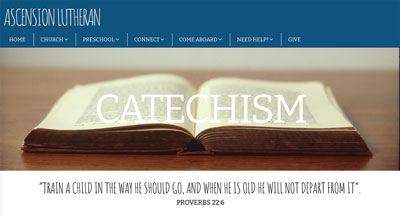
St. Paul, a multi-site ministry in Wonewoc and Hillsboro, Wis., is trying something new for its confirmand examination this year—personal examinations by the pastor. Jacob Limpert, pastor at St. Paul, said this was the method his father used—including when his father examined him. “With the public exam, some kids just aren’t comfortable with public speaking,” Limpert says, making it tricky for the pastor to know how much to help. Limpert says the private meetings still include basic confirmation content questions and recitation but also allow him an opportunity to talk to students individually about their faith now and in the future. Parents, who partner with Limpert for catechism instruction, have the option of attending.
See more examples of catechism models at welscongregationalservices.net/catechism.
Author: Multiple authors
Volume 111, Number 05
Issue: May 2024
- Free in Christ: Youth confirmation practices
- Free in Christ: Community outreach
- Free in Christ: Personal witnessing
- Free in Christ: Personal Bible study
- Free in Christ: Congregational Bible studies

